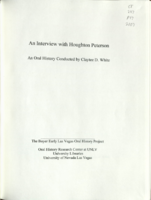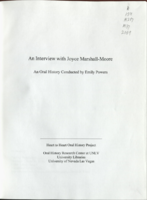Search the Special Collections and Archives Portal
Search Results

Transcript of interview with David and Iris Torjman by Barbara Tabach, November 12, 2015
Date
Archival Collection
Description
In this interview, the Torjmans recall meeting at Temple Beth Sholom and their careers in Las Vegas. David Torjman was a Hebrew School teacher at Temple Beth Sholom, and later became a dealer at the Rainbow Club and Tropicana. Iris was a health aide for the Clark County School District.
In 1964, a young Hebrew school teacher was recruited to teach at Temple Beth Sholom. Soon he met Iris Schwartz who had moved to Las Vegas to live with her aunt. Less than two years later David proposed to Iris in Jack Entratter's suite at the Sands; had a New York wedding and then a local wedding thrown by the Sisterhood at Temple Beth Sholom. The couple came from distinctively different Jewish backgrounds. David was born and raised in Morocco and was educated in trades at the ORT Vocational School in Fez, Morocco. He then studied at Sunderland Talmudical College in England before immigrating to the United States. Iris was a native of Bronx, New York. And tells how before the couple met in Las Vegas that they actually lived within blocks of each other in New York. She moved to Las Vegas to live with relatives as a young woman. In 1964 destiny brought them together. David?s career as a Hebrew school teacher brought him to Temple Beth Sholom, a career that lasted for three years. He then worked for Jerry Hory?s Hock Shop and later became a dealer for the Rainbow Club and the Tropicana. Iris worked for the Clark County School District as a health aide. They have been successful investors in local property and enjoy their retirement. They tell the story of meeting and creating a life in Las Vegas where they raised their three children.
Text

Transcript of interview with Richard Steele and Zakeisha Steele-Jones by Claytee White, February 12, 2015
Date
Archival Collection
Description
Richard Steele became interested in professional boxing at a young age when he was introduced to world champion boxers Chalky Wright and Sugar Ray Robinson. He trained at Hoover Street Gym in South Central, Los Angeles, with trainer Eddie Futch. Richard joined and boxed for the United States Marine Corps and became Marine Corps Middleweight Champion in 1963. Born in Kansas City, Missouri in 1944 Richard and his family moved to Los Angeles, California in the early 1950s. His father was a bartender and his mother was an elevator operator. During the interview Richard’s daughter Zakeisha Steele-Jones discusses the various job titles her father has held, including professional actor and campus police officer. Most notably, Richard was the second Black professional referee in both Los Angeles, California, and Las Vegas, Nevada. A profound interview heralding key character traits, such as, perseverance, resilience, strength, and determination, Richard recalls being personally invited by Nelson Mandela to referee the WBC Convention in South Africa. Some of Richard’s most memorable title fights to date include, the Hearns and Hagler fight, Sugar Ray Leonard and Tommy Hearns, and four Mike Tyson fights. Zakeisha also interjects that her father currently manages and owns a boxing gym where he trains and mentors young Black and Hispanic aspiring boxing champions and referees.
Text

Transcript of interview with Liliam Lujan Hickey by Layne Karafantis, March 18, 2010, & March 25, 2010
Date
Archival Collection
Description
Liliam Lujan Hickey is best known in the state of Nevada for being the first Hispanic woman elected to the State Board of Education as well as for the enormous contributions she made while serving from 1998 to 2000. For this, an elementary school in Clark County bears her name. Despite many obstacles, Liliam has continually dedicated herself to standing up for the causes she believes in, such as providing preschool education to the underprivileged, preparing youth to enter the workforce, helping other Hispanics run for office, and proving that with enough courage anyone can accomplish their dreams. Born in Havana, Cuba in 1932, Liliam led a sheltered life that revolved mostly around her studies at a French Dominican school. She met her first husband, Enrique Lujan, when she was only sixteen and they wed soon after. Enrique was twelve years her senior, owned many casinos on the island, and provided a luxurious existence for Liliam and their three children. However, this lifestyle abruptly changed when Castro assumed power in 1959 and Liliam and her family were compelled to relocate to the United States. In Miami, Enrique assisted other refugees financially, hoping that his wealth would remain secure in Cuba. He was wrong. This left the family destitute. In addition to casinos, Enrique had been Cuba?s coach for the Olympics. He moved the family to York, Pennsylvania, where he hoped to find work at the York Barbell Company. Liliam, who had been accustomed to having maids and nannies in Cuba, found herself doing all the housework while she also worked in a factory. The change could not have been more dramatic and the living conditions became unbearable. The family chose to move to San Diego in a Volkswagen Minivan with the hope for a better life. The next few years brought many transitions. Things did turn around in San Diego, and Liliam she recalls her years in southern California as some of the happiest of her life. Liliam found a job working at the Scripps Clinic in La Jolla. After a few years, Enrique found a job in Las Vegas and the family moved again. In Las Vegas, Liliam gave birth to her fourth child, Mary, and life once again became financially difficult for the family. In 1972, the situation grew worse with Enrique?s untimely death. Liliam was a widow at forty years of age. She had to teach herself how to drive a car, write checks, and perform financial tasks that Enrique had insisted on managing while he was alive. Determined not to give up, however, she worked tirelessly to keep the family together. Amidst all this, a friend introduced Liliam to Tom Hickey, and after a brief courtship they were married in 1981. Within a few years, Liliam became active in politics, running for the State Board of Education. Her campaign manager advised her that voters would not be receptive to photos of a Hispanic woman on billboards, and to capitalize on the name “Hickey,” which was a recognizable name because her husband was an assemblyman. She took the manager?s advice and was elected in that campaign and for two more terms, the maximum limit for the office. After the first race, she proudly displayed her face on billboards across the state. During her time at the State Board of Education, Liliam dedicated herself to helping all children receive a better education in Nevada, not only Hispanics. She co-founded the Classroom on Wheels [COW] program, which brought buses to poor neighborhoods to provide pre-school education. She established Career Day, which pairs high schools students with business professionals in an effort to help them make the transition into the workforce. While the COW program is no longer running, 8 Career Day still operates and awards scholarships in Liliam?s name annually, which helps youth receive the educational opportunities they need to succeed. And she involved Hispanic youth in Boy Scouts by bringing ScoutReach to the Las Vegas valley. Lujan Hickey worked in a wide array of other community organizations. In the 1970s, she began to work with Circulo Cubano, which later became the Latin Chamber of Commerce, and she would later belong to the National Chamber of Commerce. A longstanding member of the League of Women Voters, Liliam saw the need to get Hispanics more involved in politics in the state. Her story is one of great inspiration, and when asked why she does it, she simply replies with a smile, “I love life.” Hickey?s narrative offers the reader a glimpse of the experiences of the Cuban refugee experience in the U.S. in general. Specific to Las Vegas, it provides a rare story of the experiences of early Latinas in the political and economic development of Las Vegas in the last half of the twentieth century.
Text

Transcript of interview with Houghton Hoot Peterson by Claytee White, May 20, 2010
Date
Archival Collection
Description
Houghton Hoot Peterson played trombone in his high school band in northern Minnesota where he grew up. That same instrument would lead him to be a member of the highly regarded Air Force jazz band called Airmen of Note after enlistment. Then during a short tour at Nellis Air Force base, Hoot decided that the Las Vegas entertainment scene might have career opportunities for him. He moved to Las Vegas in 1962, an era of celebrity performers and tourists who enjoyed the crowds and nightlife. Hoot's point of view was as a musician in the band, most often a Strip relief band. But he also has tales of famous musicians and late night jam sessions. Hoot's career spanned 20 years. Eventually the Las Vegas scene for live musicians began to change. When times got tough for Hoot, he worked as a carpenter and at a music store. In this interview he discusses his fascinating past and offers advice for today's musicians.
Text

Transcript of interview with Kenny Kerr by Dennis McBride, May 29 & 30, 2001
Date
Archival Collection
Description
In the years following this interview, Kerr continued entertaining, although he never returned to the Las Vegas Strip. Kerr performed at OUTfest Phoenix, at Palm Springs’ Awesome August celebrations, Las Vegas’ National Coming Out Day event, and for the Gay and Lesbian Community Center’s Youth Service’s Division. Kerr also gave shows at small bars and restaurants such as Café Nicolle and DeStefano’s in Las Vegas, the Wilde Goose in Cathedral City, California, and the Plush Room in San Francisco. There were rumors that Kerr was set to replace emcee Joey Arias in Cirque du Soliel [2004] and Frank Marino in La Cage [2005], but neither turned out to be true. Instead, Kerr performed in such local gay nightclubs as Flex, Sasha’s, Krave, Suede, and, on July 31, 2012, at the Onyx Theatre in Commercial Center. In 2006, Kerr made peace with his former rival, Frank Marino. Kerr’s son, Kristin Vidal, made Kenny a grandfather with his own son, Alexander. It was clear during his July 2012 performan
Text

Transcript of interview with Joseph Thiriot by Claytee White, August 10, 2000
Date
Archival Collection
Description
Joseph Thiriot is a longtime Las Vegas resident who served the community as an educator. He was born in 1906 in Provo, Utah; one of five sons bom to George W. and Elvira Thiriot. He has vivid memories of moving about, including living in Idaho where his father sold a typing machine , a forerunner to the typewriter. Eventually the family moved to a ranch in Pahranagat Valley, Nevada, where the limits of educational opportunities compelled his paients to send him back to Provo to finish his education while living with family there. Gaining a teaching certificate enabled Joseph to teach in rural Nevada. He completed his degree at the University of Utah and after meeting Las Vegas Superintendent Maude Frazier he relocated to Las Vegas to become a teacher. He reminisces about his life and the changes that have occurred over the years in Las Vegas.
Text

Transcript of interview with Joyce Marshall-Moore by Emily Powers, March 25, 2008
Date
Archival Collection
Description
Joyce Marshall-Moore came to Las Vegas from Chicago in December of 1953. Only eight years old at the time, she clearly remembers the road trip with her father Royce (known as "Mousie"), her mother Agnes, and her two brothers. They left Chicago, where it was snowing, and arrived in Las Vegas on a cold snowy day! Joyce attended school at Sunrise Acres ES until eighth grade and then went to Rancho High School, graduating in 1962. She recalls that her father worked for a time at the El Rancho Vegas and that her mother found work at Southern Nevada Memorial Hospital. Agnes Marshall (nee Rasmussen) took her nurse's training in Buffalo, New York, and then worked at Buffalo General Hospital and Millard Fillmore Hospital. Later she joined the army and was stationed in Memphis, Tennessee, working at Kennedy General Hospital where she met Royce and married him. They moved to Chicago where she found work at Ravenswood Hospital. After their move to Las Vegas, Agnes was hired at Southern Nevada Memorial Hospital. She became disenchanted with nurse-patient interactions at the county hospital and found employment at Las Vegas Hospital. She worked there until 1976 and then was hired at Las Vegas Convalescent Center. Agnes followed her dreams and traveled during this period as well. Agnes worked with Doctors Lund, Allen, Woodbury, Sulvane, and Hardy, among others. Joyce recalls that Dr. Hardy, a cousin and look-alike to Oliver Hardy, was one of her mother's favorites. She shares anecdotes and memories of these and other doctors. Joyce remembers many aspects of her mother's life, including the fact that she took care of neighbors as well as her family and patients. She often worked double shifts and the pay was nominal, but she loved her job because of the relationships with her patients. Agnes passed away in 2006 at the ripe old age of 91.
Text

Transcript of interview with Joe M. Wilcock by Claytee White, April 17, 18, & 30, 2014
Date
Archival Collection
Description
Chef and longtime gaming executive Joseph “Joe” Wilcock was born in Detroit and raised by his mother, Ruby, and stepfather, Ross Johnson, in Sarasota, Florida; Gary, Indiana; and Harlan, Kentucky. After he graduated from high school in Gary he moved to Chicago to attend Washburne Culinary Institute. While attending Washburne Joe worked at Chicago’s Drake Hotel and lived at the Sears YMCA. After earning his certificate from Washburne, Joe worked at the newly opened Holiday Inn in Chicago, the Sea View hotel in Bal Harbour, Florida, and a resort at Blowing Rock, North Carolina. At Blowing Rock he heard about the new School of Hotel Management at UNLV and in August 1969 23-year-old Joe headed for Las Vegas with $400 in his pocket. Las Vegas was a disappointment. Joe could not get a job as a chef without first joining Culinary Workers Union Local 226-which he could not afford to do. Also, because he ran a poker game and cooked at the Chuck Wagon Diner during high school his high school grade point average was roughly a C-, which hindered his admittance into the School of Hotel Management. Undaunted, Joe found a job bussing tables at the Frontier Hotel and joined the Culinary Union so he could work as a chef. He also took three classes at UNLV that semester, earned an A in each, and was admitted to the School of Hotel Management. While at UNLV he affiliated with Sigma Chi fraternity. In his career Joe has worked in all facets of the gaming industry in such Las Vegas properties as the Flamingo Capri, the Frontier, Caesars Palace, the Tropicana, the Dunes, the Golden Nugget, the Mirage, Treasure Island, the Sands, MGM, and the Downtown Grand. He learned the business from the ground up. He also worked at Caesars Tahoe and at different times owned and operated a sandwich shop and a bar. Joe married his wife, Linda, 38 years ago in Las Vegas, in 1976. He is currently employed as a casino shift manager at the Downtown Grand hotel and is affiliated with the House Corporation of Sigma Chi Alumni, UNLV Rebel Golf, the Las Vegas Natural History Museum, and Candlelighters Childhood Cancer Foundation of Nevada.
Text

Transcript of interview with Jackie MacFarlane by Claytee White, February 4, 2010
Date
Archival Collection
Description
Jacqueline "Jackie" Tilman MacFarlane was born in her grandmother's Las Vegas home at H Street and Clark Ave. Her father John Franklin Tilman was a construction worker at Boulder Dam (now Hoover) in early 1930s. Jackie recalls her family having to move several times the Great Depression and living in rural Nevada. Eventually the family came back to reside in Las Vegas. After graduating from high school, she took a waitress job at the Spot Cafe (Main & Charleston) and then at the Askew Drive-In. It was there that she met her future husband, David MacFarlane, an Air Force cadet. David continued to work at Nellis Air force Base as a civilian until he retired in 1987. Jackie describes raising her children in Fair Circle neighborhood during the 1950s and 1960s; a time when Las Vegas was just a "small town of 50,000." She felt safe and always found work in the casinos. Her work career included being a change girl at the Mint of Fremont St. and working as the front office cashier at the Desert Inn and then working at the Sands Hotel and Casino. Eventually she became a night auditor at Sands Hotel and Casino and then at Sahara Hotel and Casino from 1970-1977. She remembers working nightshift, coming home to get the kids and husband off to school and work. After leaving Sahara, she began selling Vanda cosmetics as a home business, something she still does today.
Text
